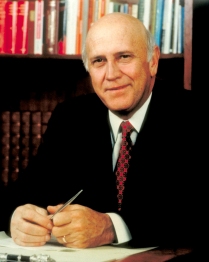Nobel Laureate and Former South African President F.W. de Klerk Speaks at SU
 |
| [Photo Gallery] |
SALISBURY, MD---In 1993 two African men, one black and the other white, stood before the King of Norway and a glittering array of world dignitaries to accept the Nobel Prize for Peace. As they did so, bombs were falling in Bosnia; bitter conflicts raged in Armenia, Azerbaijan and the Eastern European state of Georgia; and devastating wars and confrontations continued in Angola, Somalia and Burundi.
In light of those times—and today—the accomplishments of the two, Nelson Mandela and F.W. de Klerk, seem formidable: the end of apartheid in South Africa and the transition to a new democracy based on the tenet of one person—one vote.
On Monday, April 9, de Klerk, Nobel Peace Prize winner and former president of South Africa, who now heads the F.W. de Klerk Foundation devoted to working for peace in divided societies, comes to 久久国产精品久久.
He speaks on “Leadership and Making a Difference” at 7 p.m. in the Maggs Center as part of the “One Person Can Make a Difference” Lecture Series. Admission is free, but tickets are required. Two tickets per person are available at the Information Desk in the Guerrieri University Center on a first come, first-served basis.
De Klerk, 71, was born in Johannesburg and trained in law. He was elected to Parliament in 1972. He became leader of the National Party, then president in 1989. In one of his first speeches after assuming the presidency, he called for a non-racist and democratic South Africa. He released Mandela from prison and the two worked together.
De Klerk initiated the drafting of a new constitution which led to a multiracial transitional government. Following the general election of 1994, he served under Mandela as one of two executive deputy presidents in a Government of National Unity.
In his Nobel Prize address, de Klerk spoke about many themes, philosophical and practical: that the peace “that surpasses all understanding” comes from a faith in and relationship with a creator; that no real peace can occur without justice or consent; and that peace cannot continue without constant effort, planning and hard work. He also believed economic development went hand in hand with democracy.
A sought-after figure around the world, de Klerk is honorary chairman of the Prague Society for International Co-operation and is on the advisory boards of the Peres Centre for Peace in Israel and the Global Panel in Germany.
With Vaclav Havel and Eli Wiesel he plays a substantial role in the Forum 2000 think tank. In 2004 he established the Global Leadership Foundation, with headquarters in London, which frequently advises national leaders in the developing world on complex political and economic issues.
De Klerk’s visit marks the 15th anniversary of the Center for Conflict Resolution and a decade and a half of conflict resolution growth at SU. In 2000 the University established a bachelor’s degree in conflict analysis and dispute resolution, the only undergraduate program of its kind in Maryland. The Master of Arts in conflict analysis and dispute resolution is slated to begin in fall 2008, which will make SU one of only two universities in the country with such bachelor’s and master’s programs.
SU’s CCR is one of only a few programs nationwide actively engaged in on-the-ground research, which takes students and professional practitioners from the center literally around the globe. This provides unique opportunities in an undergraduate program.
The de Klerk visit is sponsored by the Maryland Mediation and Conflict Resolution Office; Office of the President and Provost; Offices of the deans of the Perdue School of Business, Fulton School of Liberal Arts, Seidel School of Education and Professional Studies and the Henson School of Science and Technology; Multicultural Student Services; Vice President of Student Affairs Office; Fair Practices Office; Student Government Association; SU Foundation, Inc.; and the Center for Conflict Resolution Board of Directors.
For more information call 410-219-2873 or visit the SU Web site at www.salisbury.edu.
